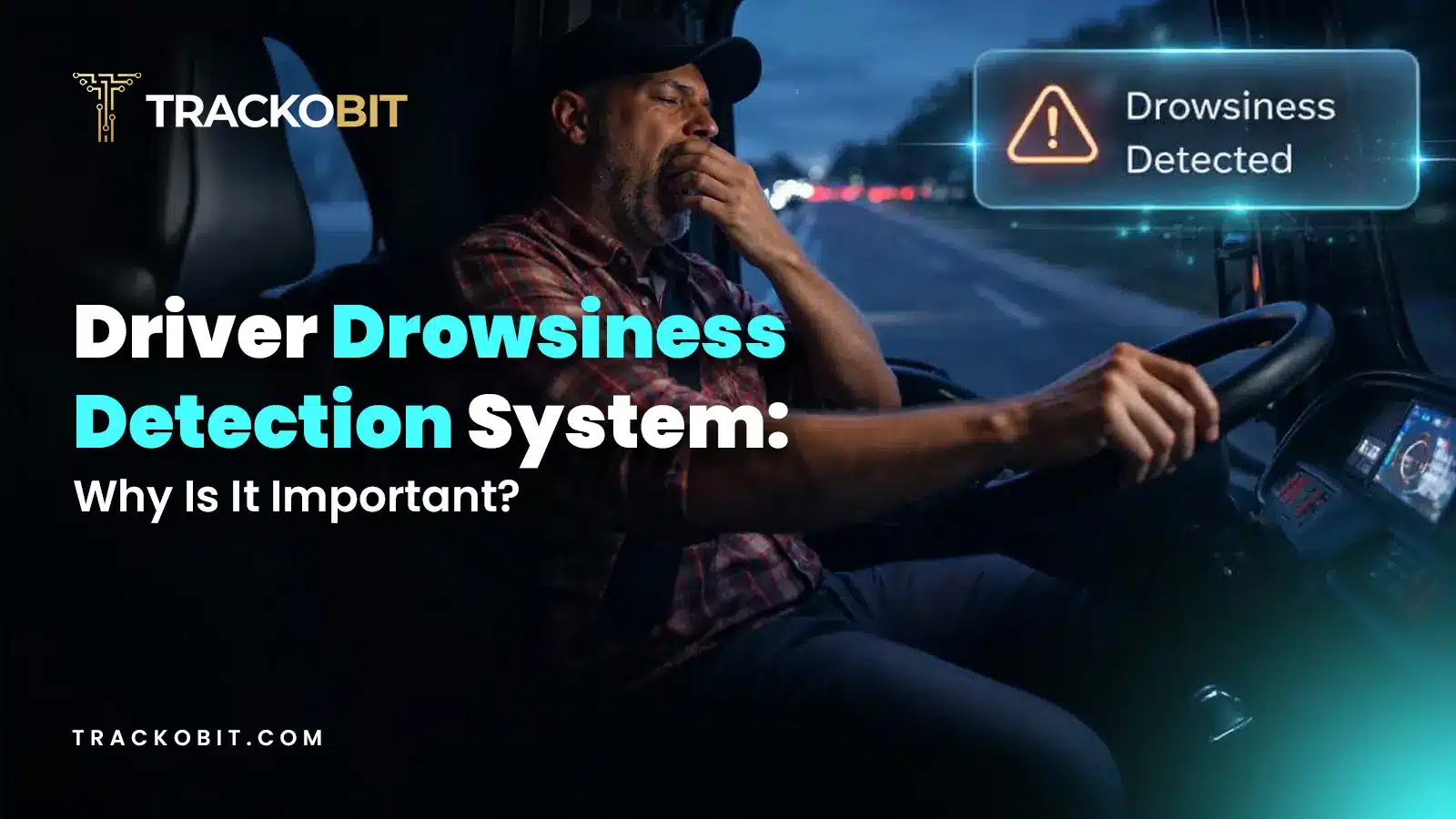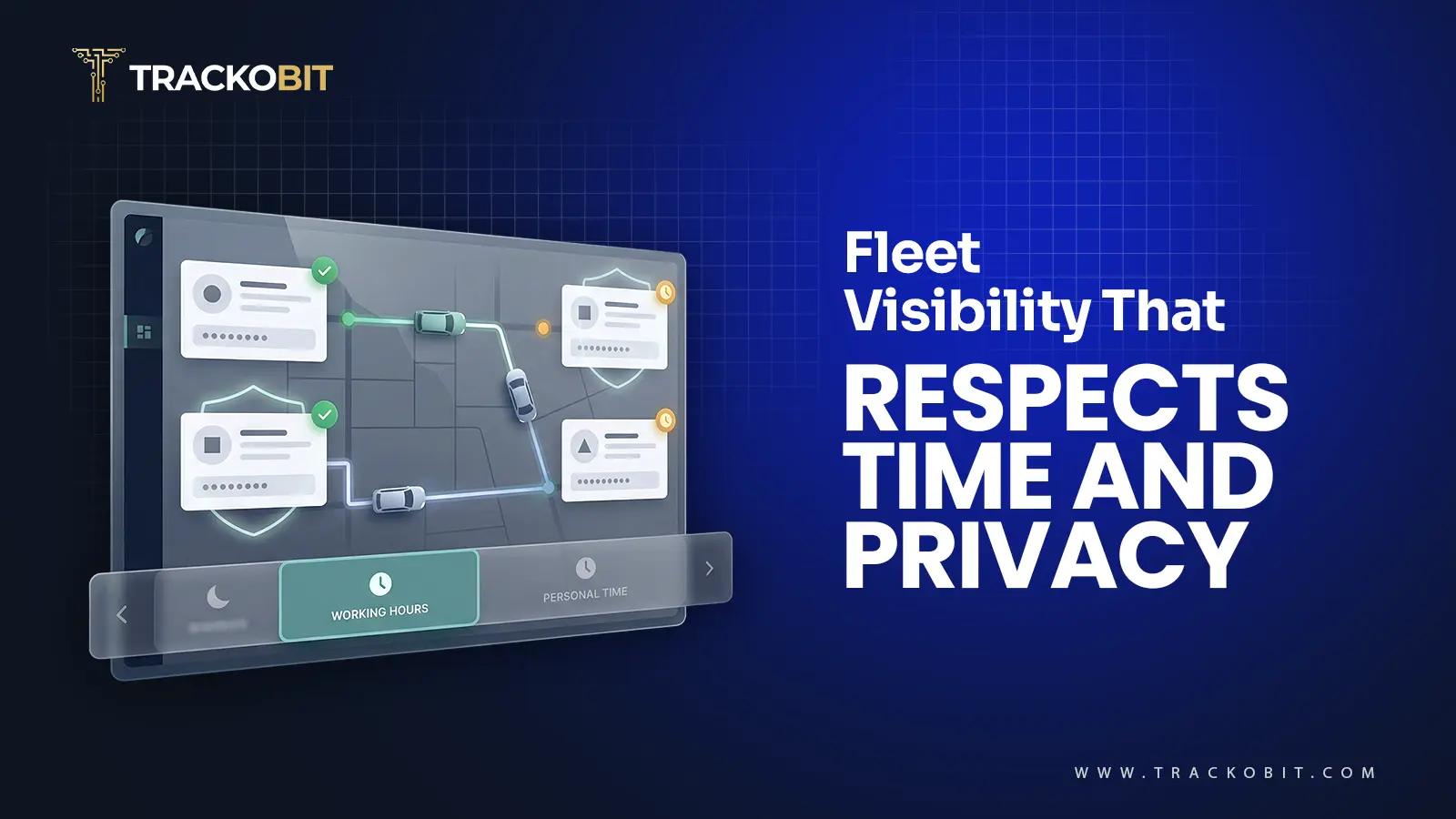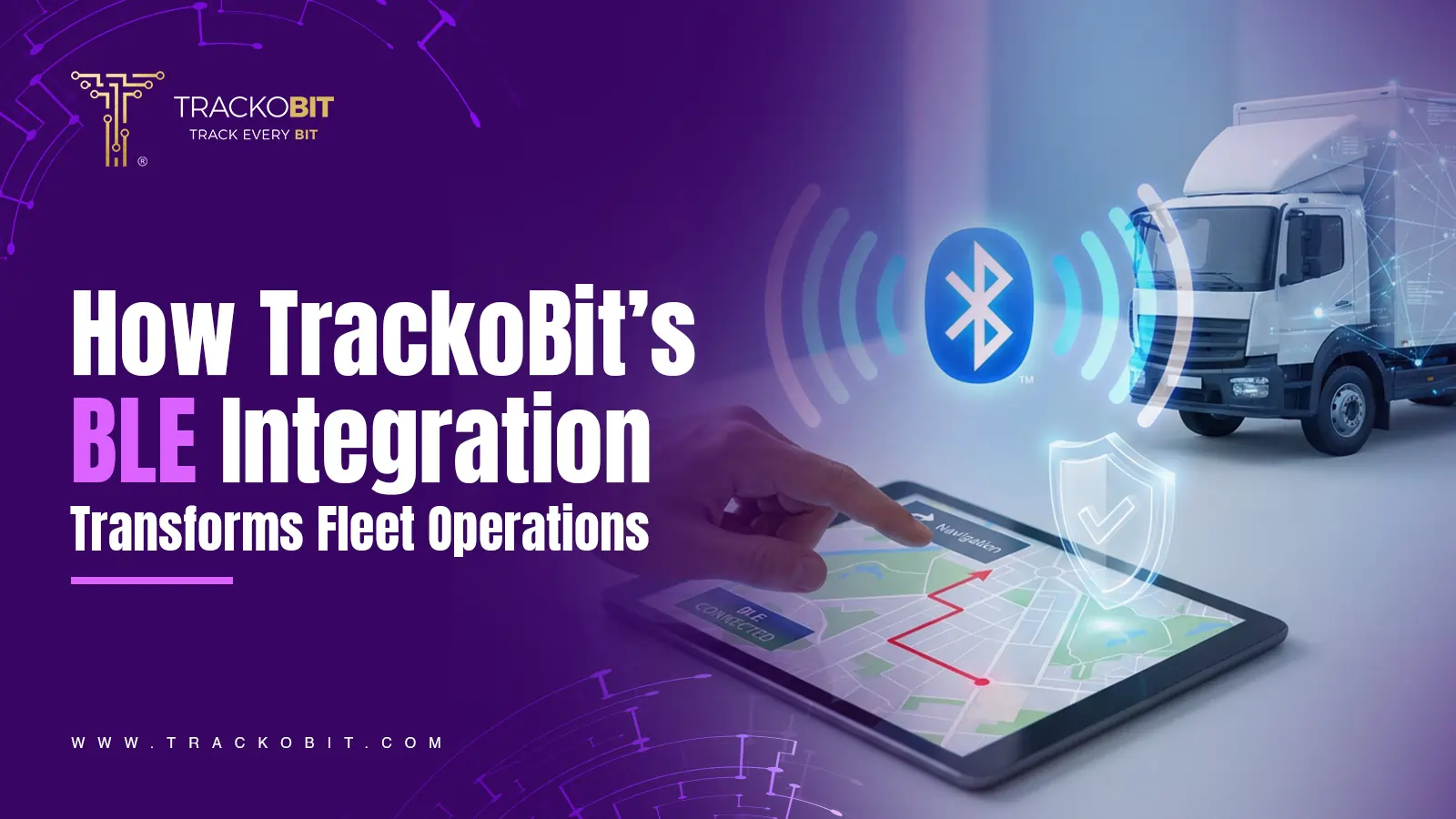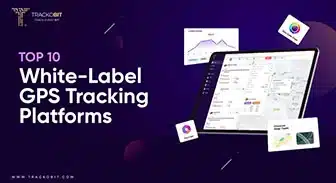-
TrackoBit
Manage commercial vehicles with the new-age Fleet Management Software
TrackoBit -
TrackoField
Streamline your scattered workforce with Field Force Management Software
TrackoField -
Features Resources
-
Blog
Carefully curated articles to update you on industrial trends. -
White Paper
Insightful papers and analysis on essential subject matters. -
Glossary
Explore an alphabetical list of relevant industry terms. -
What’s New
Get TrackoBit & TrackoField monthly updates here. -
Case Study
Explore the cases we solved with our diverse solutions. -
Comparisons
Compare platforms, features, and pricing to find your best fit.
-
About Us
Get to know TrackoBit: our team, ethos, values, and vision. -
Careers
Join the most dynamic cult of coders, creatives and changemakers. -
Tech Support
Learn about our technical support team and services in detail. -
Events
Check out the exhibitions where we left our marks and conquered. -
Contact Us
Connect with us and let us know how we can be of service.
7 Key Benefits of GPS Tracking System
- Author:Anvesha Pandey
- Read Time:6 min
- Published:
- Last Update: December 13, 2024
Table of Contents
ToggleAre you keen to know what are GPS Tracking systems and how they benefit your fleet operations? This comprehensive guide lets you know starting from its meaning to the array of benefits the system provides.
Table of Contents
Toggle
For businesses involved in logistics and transportation staying informed and in control is more important than ever. However, manually tracking the location of your fleet can be a bit of a complex task.
Fortunately, we have a solution that’s more like Aladdin’s Lamp – Yes, it’s GPS Tracking Systems. GPS tracking systems offer a powerful solution that goes beyond just locating things – they provide a wealth of data and insights that help improve operational efficiency.
Now that we have told you the solution, let’s just unfold every bit of GPS tracking systems and also the benefits that come along with them.
So without any further ado let’s get into this piece of writing.
What are GPS Tracking Systems?
GPS tracking systems are technological systems that utilize the Global Positioning System to determine the precise location of a vehicle or asset in real-time. These systems provide real-time location data of vehicles, assets, or any valuable consignments, allowing fleet managers to precisely monitor their movement and whereabouts in real-time from any remote location. In simple words, GPS tracking devices or systems let you know the live location of your fleet. Along with several stops or halts taken throughout the assigned trip.
These systems typically consist of a GPS receiver installed in the vehicle or asset being tracked, which communicates with a network of GPS satellites orbiting the Earth.
Further, the receiver collects signals from multiple satellites, then calculates the position of the vehicle using trilateration (a process of determining a position by knowing its distance from at least 3 known points), and then this locational data is transmitted to a central server or monitoring platforms.
![]()
GPS tracking solutions offer a wide range of features and functionalities, including.
1) Real-time tracking- From the aspect of fleet management, with GPS tracking systems, fleet managers can monitor the exact location of their assets, vehicles, or drivers in real time. The system provides accurate and up-to-the-minute information.
2) Historical tracking data- GPS tracking systems often store location data of past trips which fleet managers can playback anytime to view the vehicle’s past movements and track historical routes. This means fleet managers can have an insight into the entire history of the trip, starting from its origin to its destination with the number of stops and the route opted by the driver.
They can use this data to find the most economical and efficient routes and save it for recurring trips.
3) Geofencing- Fleet managers can set up virtual boundaries called geofences. Whenever the vehicle enters or exits the defined geofences, the managers will receive alerts about the same.
4) Speed Monitoring- GPS tracking platforms help monitor the speed of the vehicle being tracked. This further helps in ensuring compliance with speed limits and improved road safety.
5) Assets Management- Fleet management or logistic companies can use GPS tracking solutions to efficiently manage their variety of moving and non-moving assets, be it fleet, heavy equipment, equipment or so to ensure safe and secure movement.
To sum it up, GPS tracking solutions provide valuable insights and control over tracked entities. GPS tracking offers enhanced security, efficiency, and insights to fleet managers.
![]()
📌 Some stats and figures related to Fleet Management
Source- G2 fleet management data |
7 Key Benefits of GPS Tracking System
In fleet management, visibility, and efficient route planning would never have been possible without GPS tracking systems. Let’s have a look at some key features of GPS tracking systems that optimize fleet operations.
![]()
1) Enhanced Fleet Efficiency
For all fleet management businesses, GPS tracking systems are more like an Aladdin’s lamp as they offer significant advantages. These systems enable fleet managers to monitor vehicle location, speed, route adherence, and fuel consumption in real-time. With the help of detailed insights or the data provided by the system, businesses can identify inefficiencies, optimize their routes, and reduce the idle time of their vehicle.
Additionally, GPS tracking systems also help to enhance driver safety by monitoring driving behavior and providing feedback on risky driving practices.
2) Increased Productivity
GPS tracking systems help in streaming your fleet operations and improving productivity by enabling better trip allocation, optimum vehicle utilization, and transparency between the fleet manager and the drivers.
By knowing the precise location of their fleet, managers can dispatch resources more efficiently and minimize downtime. Better operational optimization leads to increased productivity and ultimately improves customer satisfaction.
3) Improved Asset Management
GPS tracking systems provide real-time visibility into the location and the status of assets such as vehicles, drivers, and assets. By accurately tracking the movement of assets, businesses can optimize asset utilization, prevent loss or theft, and also improve overall operational efficiency.
This enhanced visibility allows businesses to make informed decisions about resource allocation and utilization.
4) Enhanced Fleet Security
GPS tracking systems play a crucial role in enhancing the security of the fleet by providing real-time tracking and alerts on unauthorized asset movements. In the event of theft or any kind of unauthorized use, GPS tracking systems enable swift recovery efforts by providing accurate location information to fleet managers and law enforcement authorities.
Adding more GPS tracking devices acts as a deterrent against theft and unauthorized use, helping to protect valuable assets and reduce insurance costs.
5) Reduced Fuel Costs
GPS tracking systems also help reduce fuel costs. Such systems help you plan efficient routes, minimize idling, and have a look at driving events putting strain on the engine, which further helps save fuel spends.
6) Improved Route Planning
GPS fleet tracking systems help fleet managers plan the most efficient and miles-saving route. This further helps eliminate the need for unwanted coordination between fleet managers and drivers and improves efficiency by suggesting the most optimized route.
Additionally, there is also a unique feature of the GPS system is that it can recommend alternative routes in events of traffic jams due to road closures, or accidents. This helps improve driver productivity and client/ customer satisfaction due to on-time service.
7) Improved Customer Satisfaction
By implementing GPS tracking solutions, businesses can share precise ETA links to their clients/customers on the receiving end which adds to better customer experience. Moreover, businesses get features to set PODs that will act as a piece of digital evidence and confirmations of successful delivery completion.
![]()
Final Words
To sum it all up, GPS tracking has been a powerful and indispensable tool for almost every fleet management business. After all, business companies face the danger of losing 55% of their productivity and profitability without effective GPS tracking systems.
The system provides you with accurate locational data, physical asset tracking, and route optimization. GPS tracking systems provide an array of benefits including enhancing the efficiency of the fleet, increasing productivity, better asset management, and more.
They facilitate streamlined fleet operations, optimize delivery routes, up-to-the-minute location updates, and enhance field employee’s safety.
Track Better with TrackoBit
If you are planning to opt for GPS fleet tracking software, TrackoBit can stand out as a choice as this solution provides you with accurate locational details and real-time visibility of your fleet. Additionally, you get more features like route planning, video telematics, and more.
Want to know more,
Just open the new tab and get in touch!
In the end, we hope you will never get confused while thinking of the benefits of GPS tracking systems.
FAQs
-
What are the features of GPS tracking systems?
GPS tracking systems offer real-time location tracking, route optimization, geofencing, driver behavior monitoring, maintenance scheduling, and other reporting capabilities. These systems use GPS technology to provide accurate location data and can be customized with additional features to meet specific fleet management needs.
-
How does GPS fleet tracking work?
GPS fleet tracking systems work by installing GPS tracking devices on vehicles, which continuously receive signals from satellites to pinpoint their location and then transmit information about this location to centralized software, where fleet managers can access it in real-time. The software processes the data and provides insights such as the vehicle’s location, speed, and road history.
-
What are GPS trackers?
GPS trackers are small devices with built-in GPS receivers that use signals from satellites to determine a tracking object’s exact location. These trackers are typically mounted on vehicles or assets and transmit location information to a central server or software platform, allowing users to monitor and track their valuables’ location in real-time.
-
How accurate is GPS fleet tracking?
GPS fleet tracking systems are generally very accurate, most offer location data typically accurate to within a few meters. However, accuracy can be affected by factors such as signal interference, atmospheric conditions, and high-rise buildings obstructing the signals. Despite these limitations, GPS fleet tracking remains a reliable tool for monitoring and managing fleets.
Anvesha is a communication specialist at TrackoBit. With a strong background in media and communications, she adds much-needed balance and brevity to TrackoBit’s... Read More
Related Blogs
-

Why is Driver Drowsiness Detection System Important for Fleet Management?
Shemanti Ghosh February 4, 2026A driver drowsiness detection system is critical for fleet management. It helps prevent fatigue-related accidents and reduces operational risks through…
-

When Tracking Needs a Clock: Rethinking Fleet Visibility
Tithi Agarwal December 24, 2025Read on to understand why fleet tracking works better when it follows working hours. Because visibility should support operations, not…
-

What Makes TrackoBit’s Video Telematics Software Truly Next-Gen?
Shemanti Ghosh December 17, 2025TrackoBit’s video telematics software blends smart video intelligence with full server control. The result? Superior fleet reliability and safety.
-

Plug, Pair, Perform TrackoBit Introduces BLE Sensor Integration
Tithi Agarwal November 26, 2025TrackoBit’s BLE Sensor Integration enables wireless, real-time monitoring with faster installs and accurate insights. It improves fleet efficiency, visibility, and…

Subscribe for weekly tips to optimize your fleet’s potential!
Your inbox awaits a welcome email. Stay tuned for the latest blog updates & expert insights.
"While you're here, dive into some more reads or grab quick bites from our social platforms!"Stay Updated on tech, telematics and mobility. Don't miss out on the latest in the industry.
We use cookies to enhance and personalize your browsing experience. By continuing to use our website, you agree to our Privacy Policy.




































